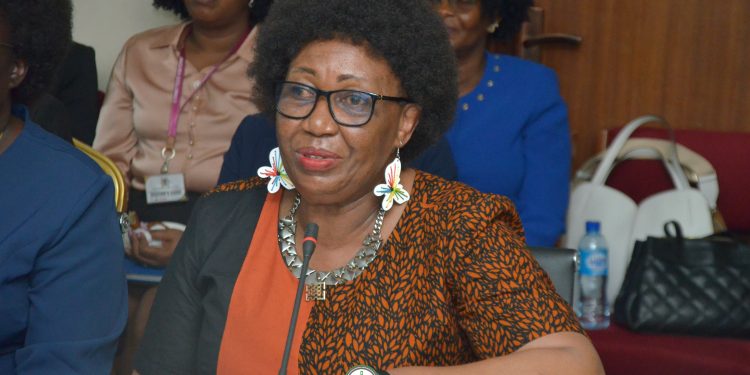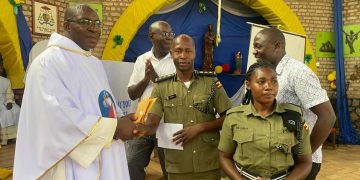Members of Parliament on the Legal Committee have strongly criticized the Uganda Human Rights Commission (UHRC) for awarding what they described as inadequate compensation to victims of human rights violations. Lawmakers argue that some victims receive as little as Shs5 million, an amount they deem insufficient given the severity of the violations suffered.
Leading the charge was Bugiri Municipality MP Asuman Basalirwa during a meeting between the Committee and UHRC officials, who had appeared to defend the agency’s 2025/26 Ministerial Policy Statement. He urged the Commission to increase compensation amounts to between Shs100 million and Shs200 million.
“I want to understand why these days your Commission is not making bigger awards to victims of human rights violations because by this simple calculation means these 16, on average, each received Shs30 million. But you are talking about Shs30 million and what are the human rights violations? In your own document, you are talking about torture. So, somebody is tortured, comes before the tribunal and is awarded Shs30 million on torture,” said Basalirwa.
He further questioned the fairness of the current compensation, arguing that it should be increased to reflect the gravity of the violations.
“You even talk about denial of right to life in your own document and you’re awarding Shs30 million. Right to security and you’re awarding Shs30 million. Aren’t you condoning human rights violations by these meagre awards? Somebody has been tortured and you are giving them, and I’m just making an average, but I know for sure that these days you are awarding Shs5 million, Shs7 million over human rights violations. This is really ridiculous. What stops you from making an award of Shs100 million, of Shs200 million?” he questioned.
In response, UHRC Chairperson Mariam Wangadya outlined some of the Commission’s achievements in 2024-2025, including handling 1,606 cases—992 from men and 614 from women—out of which 95 cases met the admissibility criteria. She noted that while 16 cases had been resolved, the Commission struggles with delayed compensation payments from the agencies responsible for making them.
“Our decisions face challenges due to delayed compensations. We intend to engage the Ministries, Departments, and Agencies to address the challenges and agree on the way forward. Complainants also face challenges in accessing incidental services in relation to their complaints such as getting a death certificate to prove death in matters of life,” explained Wangadya.
Additionally, MPs expressed concern over UHRC’s failure to visit detention facilities in Buganda, despite the region being identified as a hotspot for human rights violations.
Presenting before Parliament’s Human Rights Committee, Wangadya revealed that the Commission had visited 303 places of detention during the 2024/25 financial year. These included 72 prisons, 230 police facilities, and one remand home across the country’s 12 regions.
However, MPs scrutinized the report, particularly questioning why the Commission had not visited detention facilities in Buganda. MP Odur pointed out that the Central Region has been the epicenter of human rights violations but was seemingly overlooked in favor of Gulu.
“Forced disappearances, abductions, arrests by whatever then has been done by the military and many of them happened here in the Central and I find it surprising that the Commission now chose to go and visit the detention facility in Gulu yet here, which is the epicentre of all this here in Buganda, here in the Central, you didn’t visit,” he stated.
He also pressed the Commission to explain why military detention centers were not included in their visits.
“If you look at the cases of people who have been taken to court and others have been dumped in many places, they have been tortured. Could we have an explanation, why the Commission all of a sudden found to run away from the core issue of visiting the Military detention centres?” Odur questioned.
Butembe County MP David Livingstone Zijan also questioned UHRC’s focus on Gulu, asking whether the Commission intends to train human rights violators, citing JATT as an example of how security forces should handle the media.
“What informed your choice of Gulu? What was your finding and does it give a representation of the entire country? Does the education of the media to report sensitively yet they are victims of human rights other than the security forces? Do you also seek to train the violators or JATT on how to handle the media in the spirit of human rights? Or you can’t face the perpetrators themselves?” he asked.
In response, Wangadya emphasized the importance of having a budget that aligns with UHRC’s mandate to enable the delivery of justice.
“I think we should concede that our mandate must relate with the budget fairly. Human rights issues should attract a big budget. We have now learnt but the director of research can answer why the directorate takes the lion’s share. We undertake to increase allocations in investigations and complaints registrations. Concede that the development budget has become more important than core mandate. We have no capacity to tell who are political prisoners. Maybe the public may judge. We were perturbed by the bail terms by court on Eron Kiiza,” she said.
Wangadya also informed the media that the public appreciates the Commission’s work, highlighting the establishment of human rights courts across the country to ensure access to justice.
“Most Ugandans appreciate our work. We have taken human rights courts across the country to deliver justice,” she stated.



















